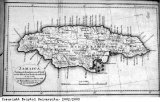The Swymmer brothers
Anthony Swymmer was a Bristol merchant. In the 1660s he was living in Port Royal on the Caribbean island of Jamaica. He was the island’s official representative of the Society of Merchant Venturers, Bristol’s elite merchant society which controlled foreign trade. His son Anthony owned land in Jamaica. The son Anthony was in business with his brother William, who was based in Bristol. They were trading in sugar (produced on the slave plantations) and also in enslaved Africans. This was in the 1680s, when the London-based Royal African Company had control of slave trading. The Swymmers were thus probably trading illegally, although it is possible they were buying slaves themselves from the Royal African Company and simply selling them on. In one deal they made, they agreed to supply the Bybrook Plantation, in Jamaica, belonging to William Helyar from Somerset, with 10 enslaved Africans. Their agent in Jamaica however, failed to deliver the agreed slaves to the plantation, and sold them to someone else for less than Helyar had agreed to pay for them. The Swymmers probably lost money on the deal, but they were anxious not to lose customers. The letter notes that 40 of the 120 enslaved Africans on the ship died, a very high death rate. They told Helyar that the slaves that survived had actually been in very poor condition, and might well have died in the first year if he had bought them. They tried to argue that it was therefore a good thing that their agent had sold the poor slaves elsewhere. They offered to buy him another 10 from the first ship that arrived in Jamaica, through Anthony Swymmer. The letter from William Swymmer and his Bristol partner William Hayman, dated January 1684, reads:
“In January last we covenanted [agreed] with you to deliver you ten Negres Slaves to say five men and five women in the Island of Jamaica at £17 sterling p head to be pd. In this citty and according to the covenant with you we forthwith gave order to our factor Mr Robert Legg in Jamaica to deliver to you sd tenn negros to you. Now we understand that Robert Legg did not deliver you sd Negros but for what reason we know not, and have sold them for lesse moneys than you were to pay for them and have also acted many other things to our own prejudice and losse …Sir, we are much conserned that you order was not completed… considering we were connected with so worthy a Gent. as you selfe though we believe noe way prejudicial to you notwithstanding that Mr Hellyar your overseer of your plantations writes you; for our negroes proved very sicke and dyseased this yeare, and lost forty of 120 and the rest were landed very much out of order and would have been capable but of very little service thise yeare if they had lived which is much to be feared.”



